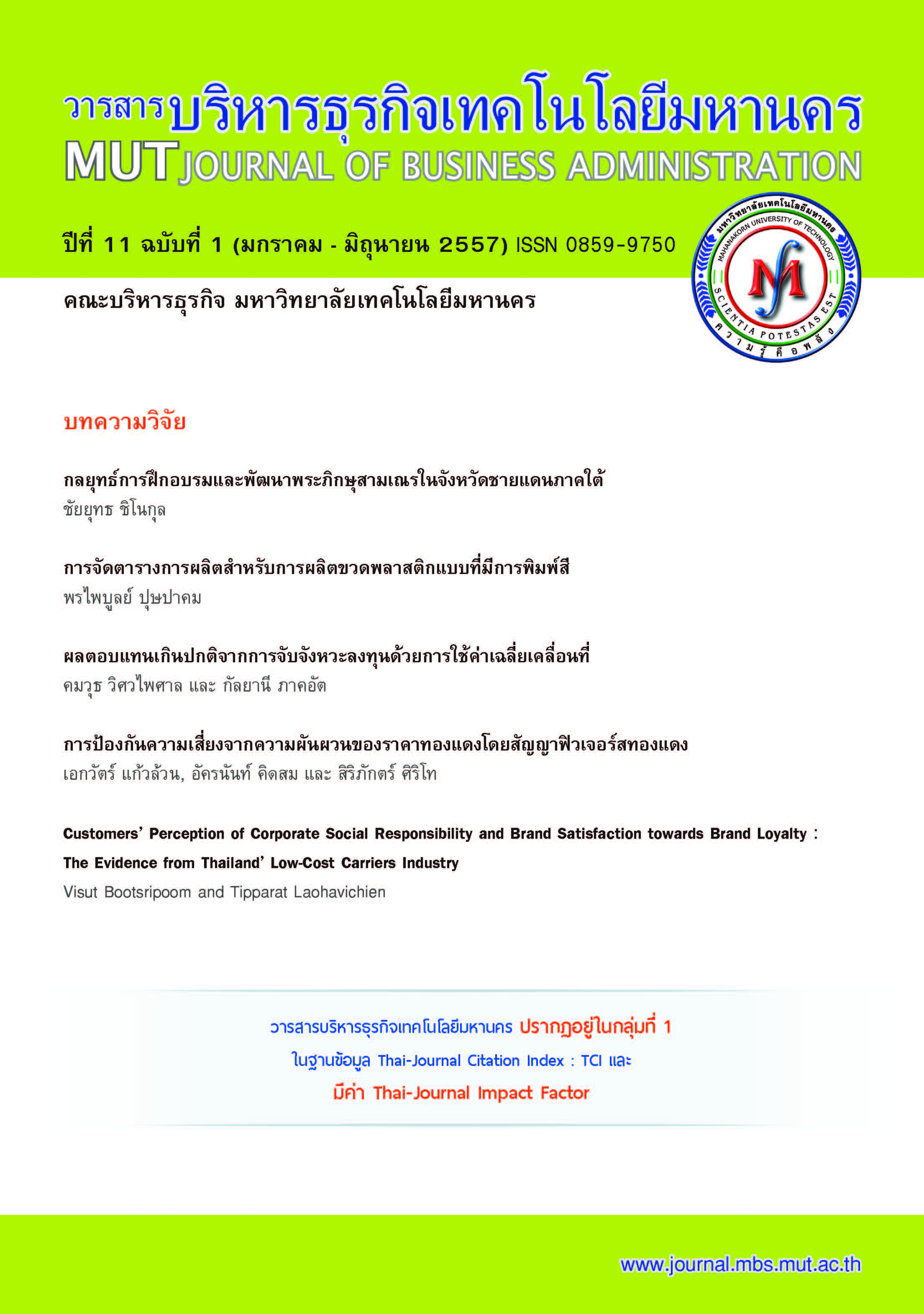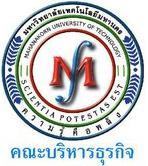กลยุทธ์การฝึกอบรมและพัฒนาพระภิกษุสามเณร ในจังหวัดชายแดนภาคใต้
Keywords:
กลยุทธ์การฝึกอบรมและพัฒนา, จังหวัดชายแดนภาคใต้ของประเทศไทย, Training and Development Strategies, Southern Border Provinces of ThailandAbstract
การศึกษานี้มีวัตถุประสงค์เพื่อการสร้างหลักสูตต้นแบบการดำเนินการฝึกอบรมและพัฒนา และการประเมินผลการฝึกอบรมและพัฒนาหลักสูตรพระธรรมทูตเชิงรุกในจังหวัดชายแดนใต้ โดยมีประชากรเป็นพระภิกษุสามเณรที่ปฏิบัติภารกิจในจังหวัดปัตตานี ยะลา และนราธิวาส ซึ่งมีอยู่ทั้งสิ้น 1,400 รูป ในการวิจัยเชิงปริมาณได้ชุดแบบสอบถามเป็นเครื่องมือในการเก็บรวบรวมข้อมูล โดยวิธีการสุ่มตัวอย่างตามสะดวกได้แบบสอบถาม 332 ชุด ในการวิจัยเชิงคุณภาพได้ใช้การสนทนากลุ่มพระภิก ษุ และผูบริหารในพื้นที่ 3 กลุ่ม และใช้การสัมภาษณ์เป็นเครื่องมือในการเก็บรวบรวมข้อมูล หลังจากนั้นนำหลักสูตรที่วางไว้ไปดำเนินการ แล้วประเมินผลหาคะแนนความพึงพอใจ และทดสอบหาคะแนนพัฒนาการในตอนสุดท้าย
ผลการศึกษาเชิงปริมาณพบว่ากลุ่มตัวอย่างส่วนใหญ่มีอายุระหว่าง 20-30 ปี มีพรรษาตั้งแต่ 5 พรรษาลงมาส่วนใหญ่มีความรู้ทั้ง ทางโลกและทางธรรม วุฒิทางธรรมส่วนใหญ่มีความรู้นักธรรมมากกว่าวุฒิทางโลกส่วนใหญ่มีความรู้ชั้นมัธยมศึกษาตอนปลาย ที่วัดมีพระภิกษุสามเณรจาพรรษา รวมทั้งผู้ตอบทั้งสิ้น 5-6 รูป ผู้ตอบส่วนใหญ่มาจากจังหวัดปัตตานี ส่วนใหญ่วัดมีระยะห่างจากตัวอำเภอ 7-8 กิโลเมตร ทางด้านการสรรหาผู้ตอบคิดว่ามีปัญหา กลยุทธ์การฝึกอบรมและพัฒนาทรัพยากรมนุษย์ ประกอบด้วยการหาความจำเป็นในการฝึกอบรมเป็นประการแรก ซึ่งผู้ตอบส่วนใหญ่ตอบว่าเกิดจากความต้องการขององค์การ มีวัตถุประสงค์เพื่อพัฒนาความรู้ในการทำงาน และมีความต้องการหลักสูตรการเพิ่มขีดความสามารถพิเศษ ต่อมาด้านการดำเนินการฝึกอบรม ผู้ตอบส่วนใหญ่ไม่เคยผ่านการฝึกอบรมมาในรอบ 2 ปี เนื่องจากงบประมาณมีจำกัด ผู้ตอบต้องการให้จัด การฝึกอบรมช่วงเช้า ครั้งละ 1-2 วัน โดยจัดที่วัด สุดท้ายด้านการประเมินและติดตามผล ส่วนใหญ่คิดว่าการฝึกอบรมเหมือนกับ การให้รางวัลที่ผ่านมาเคยได้รับการติดตามผล และควรมีเงื่อนไขสนับสนุนการอบรม ในการวิจัยเชิงคุณภาพพบว่าในกลุ่มนักเผยแผ่ได้ทำการหาความจำเป็นในการฝึกอบรมอยู่บ้าง แต่ผู้บริหารภาครัฐ ยังไม่ได้ใช้ในการกำหนดนโยบายและวางวัตถุประสงค์ของหลักสูตรในขั้นตอนนี้ผู้ตอบสนใจหลักสูตรพระธรรมทูต ผู้วิจัยจึงสร้างหลักสูตร 18 ชั่วโมงครึ่งขึ้นโดยเน้นทางทฤษฎีการจัดการ การสร้างทีมงานจิตวิทยาการบริหาร และปฏิบัติการทางภาษา ผู้วิจัยใช้เวลาวันละ 6 ชั่วโมง รวม 3 วันจัด หลักสูตรโดยเน้นการบรรยายและการสัมมนากลุ่ม โดยมีขั้นตอน คือ ก่อนการฝึกอบรม ขณะที่ฝึกอบรม และภายหลังการฝึกอบรม สำหรับการประเมินผลหลักสูตรนั้นผู้วิจัยพบว่าผู้เข้ารับการฝึกอบรมให้คะแนนความพึงพอใจรวมอยู่ในระดับมาก โดยให้คะแนนความสอดคล้องกับวัตถุประสงค์ และความรู้ของวิทยากรในระดับมากที่สุด ส่วนผลคะแนนพัฒนาการของผู้เข้า รับการฝึกอบรมได้ 100 คะแนนเต็ม ถึงร้อยละ 45 ของผู้เข้ารับการทดสอบ ผู้วิจัยมีข้อเสนอแนะว่าทุกขั้นตอนตั้งแต่การสรรหาและการฝึกอบรมต้องบูรณาการยุทธศาสตร์หลัก เข้ากับยุทธศาสตร์ทรัพยากรมนุษย ์ แล้วมองเป็นระบบโดยหาผู้รับผิดชอบบูรณาการทำงานในระดับภูมิภาค อาจจัดตั้ง “ศูนย์การจัดการทรัพยากรมนุษย์เชิงกลยุทธ์พระภิกษุสามเณรในจังหวัดชายแดนภาคใต้ดูแลทั้งระบบ” ส่วนการดำเนินการฝึกอบรมต้องทำงานร่วมกับนักวิช าการเฉพาะ เนื่องจากต้องใช้ความรู้และประสบการณ์มาก การประเมินผลควรทำลักษณะ 360 องศา ในหลักสูตรที่จัดตามความต้องการผู้เรียนตั้งแต่แรก
Training and Development Strategies of Monks and Novices in Southern Border Provinces of THAILAND.
The main objectives of this study were to design, implement and evaluate the training and development course for Buddhist Missionary (Dhammaduta) in the Southern border provinces of Thailand. The population of study consisted of 1,400 monks on mission in Pattani,Yala and Narathiwat. The quantitative tools used for data collection were questionnaires. A convenient sampling technique was employed in this study. The completed 332 questionnaires were obtained for data analysis. The qualitative instruments used for data collection were focus group discussions and interview.
The main findings from the quantitative research were summarized as follows. Majority of respondents were between 20-30 years old, with less than 5 years of monkhood. Their education was reported to be comprised of general and religious studies. For religious study, most of the respondents studied Dhamma. With regard to general education, the majority of the respondents obtained higher secondary school level of education. There were 5-6 monks staying in the temples. The majority of them were located at Pattani Province. The distance from the city to the temples is 7-8 kilometers. The staffing was viewed as problematic. With respect to training and development strategies consisting of needs for training, the findings from the needs of organization revealed that the aim was at in-service knowledge development. More training courses should be offered to promote their core competencies. Relating to training project operation, majority of respondents never got trained in the past 2 years, and this was due to limited budget. Most respondents proposed 1-2 days-morningtraining project to be held at the temple. For evaluation and monitoring aspect, most of the respondents viewed training as reward. There should be evaluation and feedback. In addition the respondents should be supported to attend the training workshops. The main findings from the qualitative research were: the missionary monks had conducted needs analysis but the government administrators did not conduct any needs analysis before making their policies and objectives of the training. From the needs analysis of this study, Buddhist Missionary course was proposed. The researcher then designed the curriculum for missionary monks for 18 hours and a half focusing on Management Theory, Team Building, Management Psychology and English Language Practice. In implementing phase, a 3 day-developed-prototype-training course was offered for 6 hours a day. Lecture and group works were used. In the training evaluation phase, it was found from this training course that the course participants were satisfied with the course with a good score level. The congruence of the course content and the course objectives was at the highest satisfactory level. In addition, the knowledge gained from the lectures of this course was rated the highest. Forty-five percent of the course participants received the improvement scores of 100 points (full score). It was recommended that the establishment of “the Center for Strategic Human Resource Management for monks and novices in the Southern provinces of Thailand” was necessary. This center should be set up with the aim at integrating grand strategies together with human resource strategies. In implementing training project, the authorities involved should get assistance from the experts in the universities nearby since trainings need specific knowledge and experience. The evaluation of the trainings should be consistent with the training objectives and the 360 degree feedback should be employed.
Downloads
Issue
Section
License
ข้อความ ข้อคิดเห็น ข้อมูล เนื้อหา รูปภาพ แผนภูมิ แผนผัง เป็นต้น ที่ปรากฏและแสดงในบทความต่างๆ ในวารสารบริหารธุรกิจเทคโนโลยีมหานคร ถือเป็นความรับผิดชอบโดยตรงของผู้เขียนบทความนั้นๆ มิใช่เป็นความรับผิดชอบใดๆ ของวารสารบริหารธุรกิจเทคโนโลยีมหานคร และมหาวิทยาลัยเทคโนโลยีมหานคร
บทความที่ตีพิมพ์ในวารสารบริหารธุรกิจเทคโนโลยีมหานคร ถือเป็นลิขสิทธิ์เฉพาะของคณะบริหารธุรกิจ มหาวิทยาลัยเทคโนโลยีมหานคร หากบุคคลหรือหน่วยงานใดต้องการนำทั้งหมดหรือส่วนใดส่วนหนึ่งไปเผยแพร่ต่อหรือเพื่อกระทำการใดๆ จะต้องได้รับการอนุญาตเป็นลายลักษณ์อักษรจากคณะบริหารธุรกิจ มหาวิทยาลัยเทคโนโลยีมหานครก่อนเท่านั้น


